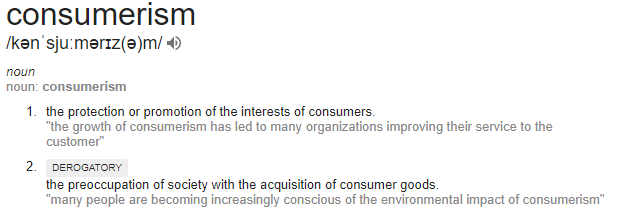How to break through the trap of consumerism
Originally published on Medium

Do you really need that new dress?

Premise 1: Humans, being social, like to be accepted in society
Premise 2: Individuals build the society. However, not everyone gets an equal say. It’s the high worth, influential components of society that determine the rules.
Premise 3: Individuals who became high worth got there as a part of the industrial revolution. They built factories for basic human utilities and goods.
 (Yes, I’m referring to the derogatory noun)
(Yes, I’m referring to the derogatory noun)
I wake up, check my phone, look at some ads telling me to buy things that will make me happy. On the way to work, I find more ads reinforcing that meme: Acceptance requires me to buy this.
At work, Patrick shows off his brand new convertible Audi. I gawk over it. I don’t know if it’s bought on credit or with cash, but that doesn’t matter, right? Because that Audi is right in front of me. I can feel it — Patrick is rising through the ranks. Am I still stuck where I was a few years ago?
I did get a few raises, keeping pace with inflation.
That’s good enough, right?
That gives me the license to spend that extra money, right?
I earned that through sheer hard work, right?
How else can I show you that I earn well?
How else can I muster favour with the people that matter?
How else can I maintain my status?
This is the way. Everyone thinks this way. Everyone’s been saying this. Everyone’s expected to follow this path. Everyone’s been drinking the Kool-Aid.

This can devolve into an endless cycle: there’s always someone to please.
Then, came the breakthrough. That little spark in the brain, mustering up other neurons, creating a voice loud enough that I couldn’t ignore it anymore.
Cognitive biases.
The media uses research into biases to exploit me. It’s funny how the incentives work. The ads businesses, the high worth people manufacturing consumer goods and luxury stores — all have incentive to get me to buy things. That’s how they drive their revenue.
Hence, research happens behind closed doors — building sales strategies via an understanding of raw human behaviour. For example, strategies like building on network effects, associating a high status with products ( hint: Apple ) and exploiting contrast bias — Have one expensive item on the menu to make everything else look reasonable.
On the other hand, psychology academics’ incentives are more ..intrinsic. They research because they want to. Since they are human, their incentives can be manipulated too. Furthermore, not everyone is keen to learn about biases. I know I wasn’t for the longest time. They were in my unknowable unknown.
Thankfully, that isn’t the case for me anymore. For you?
I haven’t gotten into how exactly these biases work, for they are for another post.

On to the question of what I did about it.
Here’s a guiding principle I follow. It helps me avert bad-impulse buying decisions:
If you’re not going to use it at least once a week, don’t buy it
Simple? It has wide ranging consequences! Am I going to wear that new pair of all-weather waterproof shoes every week? The new suit I’m planning to buy for the wedding? Those fancy wireless headphones?
That’s a yes, no, no. Did I just save £1000?
Don’t have duplicates, buy for utility and function
Fair? Do I have more than one wristwatch? More than one raincoat? To be sure I’m buying for utility and function, here’s a question I answer: What purpose will it solve?
If the answer is it will make me feel good, I’m sliding back into the trap.
“Consumerism is a philosophy of futility” — Paul Nystrom

The kicker? I wrote this on my MacBook Pro, checking my iPhone for a mail from Patrick.
